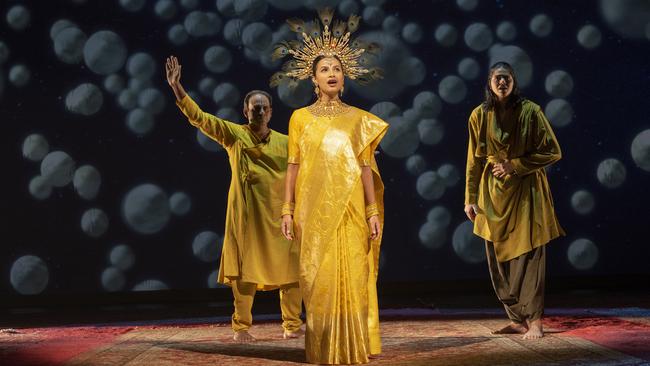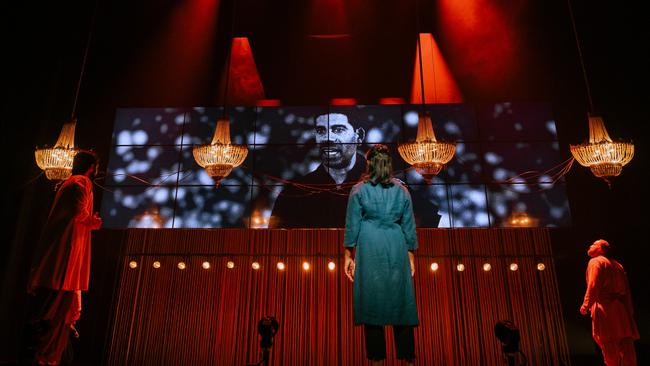Hindu epic opera renders mysteries of the universe
In its entirety the ancient Sanskrit poem is longer than the Iliad and the Odyssey put together so poses quite a challenge for anyone wanting to adapt it. Did they pull it off?

Mahabharata.
Why Not Theatre, His Majesty’s Theatre, Perth
The question is asked early and often. Who gets to decide what justice is?
As we see again and again in Miriam Fernandes and Ravi Jain’s Mahabharata, it depends entirely on whom you ask. There are two houses, alike in dignity as Shakespeare would have described them, led by hotheads who see themselves as the true and just rulers of a kingdom to which they are associated by birth.
Power determines truth, we are told. Also that when truth cannot be agreed upon, war is inevitable. The stage is set for a scorched-earth battle between rival cousins for the control they believe is their destiny.
In its entirety the ancient Sanskrit poem is longer than the Iliad and the Odyssey put together so poses quite a challenge for anyone wanting to adapt it. Canadians Fernandes and Jain (he also directs) bring South Asian heritage as well as contemporary theatre practice to the task and have come up with an engrossing, freewheeling production bursting with vitality.
Their two-part drama brings together ravishing music, classical Indian dance, mime, emphatic physicality, video and old-fashioned sharing of stories, even as the narrator, warmly played by Fernandes, admits the sprawling epic can be tricky to follow at times.
She says not to get too caught up in the minutiae of who is connected to whom, how and why and it’s good advice. Nevertheless, as the conflict gathers momentum, key characters and powerful set pieces emerge strongly and unforgettably from the maelstrom.
Mahabharata initially unfolds on an almost empty stage with the bones of the theatre visible.

A group of fine musicians seated at the back serves to underscore the action, set scenes, amplify emotions and provide sound effects. The simplicity is engaging, as is the economical, fluid way in which actors make complex events legible through movement.
The second part flirts with alienation as it hurtles into today’s world of projections and video feeds, all the better to appreciate the doublespeak of demagogue Duryodhana (Darren Kuppan), locked in mortal combat with his kinsman Yudhishthira (Shawn Ahmed).
Driven by envy, humiliation, jealousy, greed and ambition – all dynamically depicted – the men are consumed by rage and will do anything to assuage their hunger.
In the first part of Mahabharata, subtitled Karma, Yudhishthira can’t tear himself away from a game of dice he is destined to lose. He chillingly stakes everything he possesses, including himself and his wife.
In the second part, Dharma, there is a vivid and terrible description of carnage incited by Duryodhana. The slaughter goes on for many days. Carcasses litter the ground and the earth is covered in blood. As this misery is described, Shiva god of destruction (Jay Emmanual) glitters and whirls to the sound of clapping and tinkling bells.
Most audaciously there is a fabulously mind-bending detour into an entirely different universe with the Bhagavad Gita, the most sacred part of the Mahabharata. Here the god Krishna (Neil D’Souza) unveils for a warrior the mysteries of the universe, his words sung in Sanskrit by radiant soprano Meher Pavri in the manner of Baroque opera. It’s as trippy as it sounds.
After all this bounty and much more, the earnest, overextended epilogue comes as a slight disappointment even though its message is unimpeachable.
This is nevertheless a small blip in an otherwise fascinating exposition of themes that are regrettably on high rotation. Mahabharata nobly enriches this year’s Perth Festival.
Tickets: $49-$99. Bookings: online. Duration: Part I: 2hrs 40 mins including interval. Part II: 2hrs 5 mins including interval. Ends February 16.



